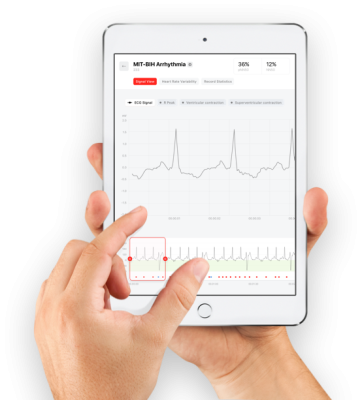
February 9, 2023 — The Cardiomatics certified online SaaS platform provides world-class Holter ECG analytics to support cardiac care. Its advanced algorithms have been validated in various clinical trials and used commercially by hundreds of cardiologists and general practitioners from over 15 countries around the world, including Germany, Switzerland, Poland and the United Kingdom.
In the latest Swiss-AF Burden Study conducted by the Swiss University Hospital Basel in Switzerland, Cardiomatics’ state-of-the-art technology was implemented to analyze signals from 7-day Holter-ECG recordings and ensure the highest-quality analysis. The study included 100 Holter recordings from patients who suffered from paroxysmal or persistent AF. Researchers compared the results of a traditional Holter ECG analysis with those of an automated Cardiomatics analysis and showed that assessment of the AF burden with AI algorithms provided very similar results to standard assessment (Pearson’s correlation coefficient: 0.998). The Bland-Altman analysis resulted in a bias of -0.006 (95% limits of agreement -0.042 to 0.030). Hence, Cardiomatics’ innovative technology is an accurate and efficient method for the assessment of the AF burden.
“During our research, we were able to compare the results of our team's manual analysis and the automated analysis provided by Cardiomatics. Our recent study enabled us to discover the potential of AI algorithms and confirmed their high precision,” said Prof. Michael Kühne, MD from the University Hospital Basel in Switzerland.
Despite the evidence currently available on the association between AF, stroke, and systemic embolism, the underlying mechanisms are still largely unknown. Moreover, therapy increasingly requires personalization and an individual approach to each patient. Thus, implementing new technologies such as AI algorithms can accelerate the diagnostic process and reduce physicians’ workload without compromising data quality. The study showed that artificial intelligence can truly complement the knowledge and experience of doctors to enhance diagnostic capabilities and improve treatment outcomes.
“The data confirm that artificial intelligence is an accurate and reliable tool that can support physicians in long-term ECG analysis. Cardiomatics software is not only precise, but as it turned out during our research, it enables us to analyse ECG signals significantly faster compared to manual analysis. At the same time, we get high-quality data and reports. Using AI in clinical practice is an opportunity for cardiologists to reduce time spent on manual ECG analysis and examine more patients who need cardiac care,”said Prof. Christine Meyer-Zürn, MD from the University Hospital Basel, Switzerland.
More and more doctors are deciding to rely on artificial intelligence tools for Holter ECG analysis. The number of Cardiomatics customers is constantly growing not only among commercial users, but also among researchers. Beyond the presented study, Cardiomatics has already started new clinical trials with the University Hospital Basel in Switzerland and other research centers, such as Weill Cornell Medicine in the USA. When it comes to commercial users, the greatest interest in Cardiomatics’ solution originates from private practice and clinics in Switzerland. The most significant advantages of the cutting-edge software mentioned by Swiss physicians are its ease of use, its accuracy and the time it saves compared to manual analysis. In a long-term perspective, it enables them to reduce their workload, examine more patients without having to increase staff numbers, perform a larger number of long-term ECGs and make more precise diagnoses much more quickly.
“We are proud that implementing Cardiomatics software in the Swiss AF Burden Study significantly improved the complex research process. It is amazing that we can so easily optimize the daily work of doctors, both for scientific purposes and in everyday medical practice. Our hardware independence, ease of integration and user-friendly platform make it effortless to deploy Cardiomatics in both hospitals and private practice. After that, medical facilities and patients can only reap business and health benefits,” said Nikola Fajkis-Zajączkowska, Clinical Project Manager at Cardiomatics.
For more information: www.cardiomatics.com


 January 15, 2026
January 15, 2026 









